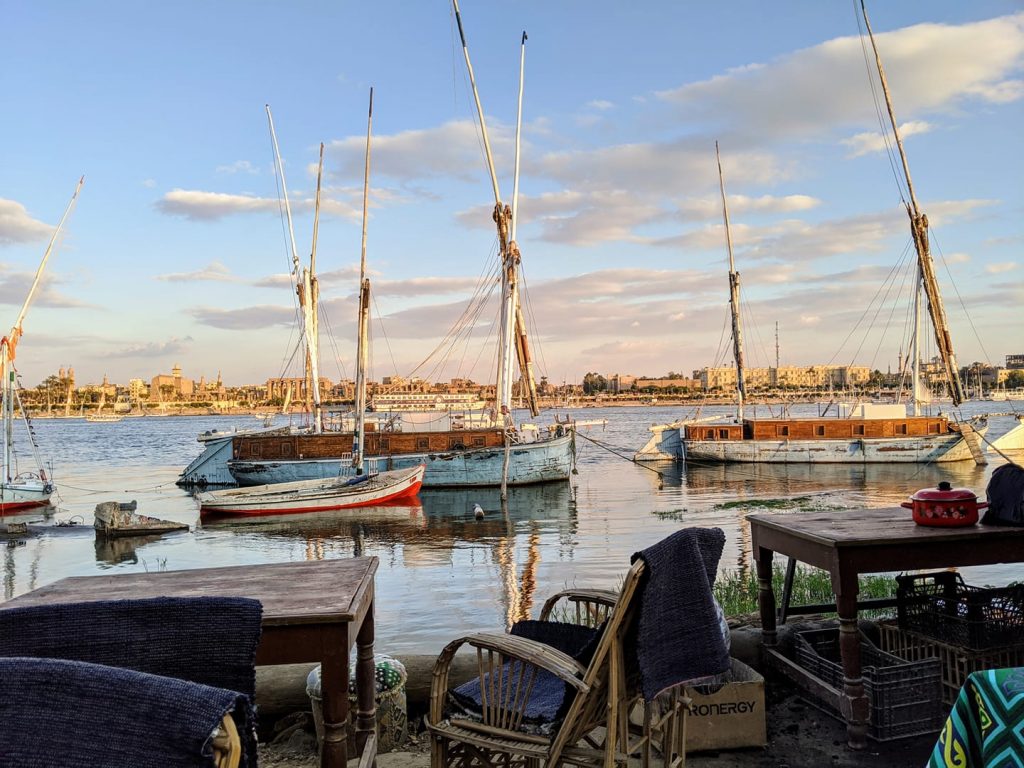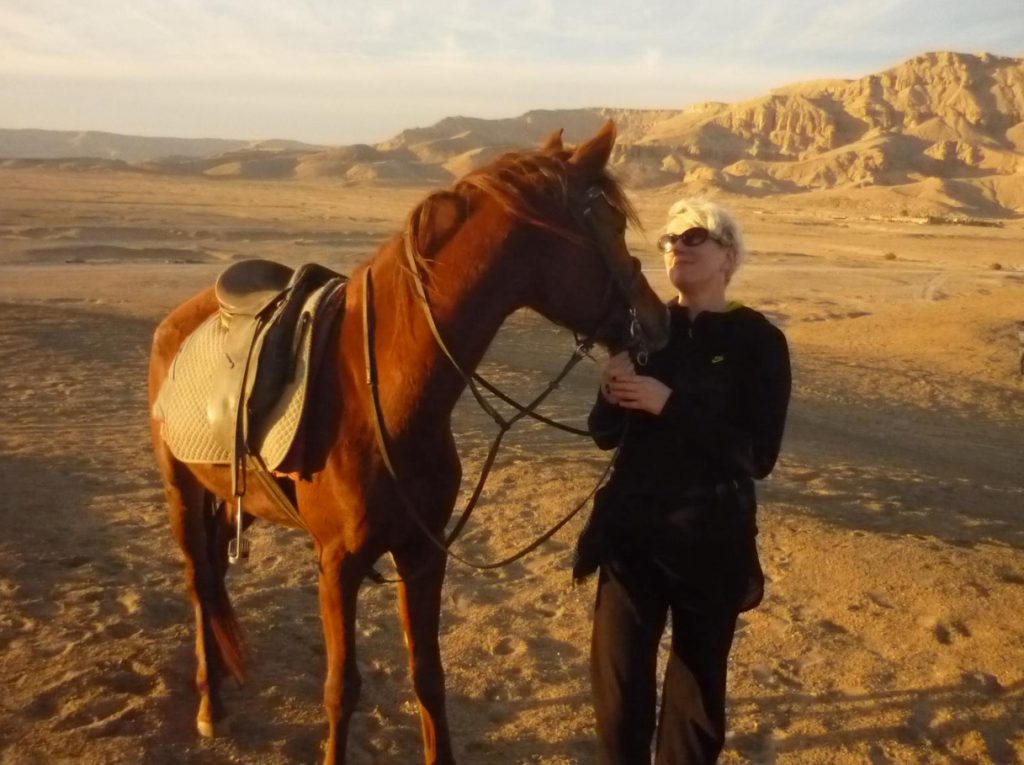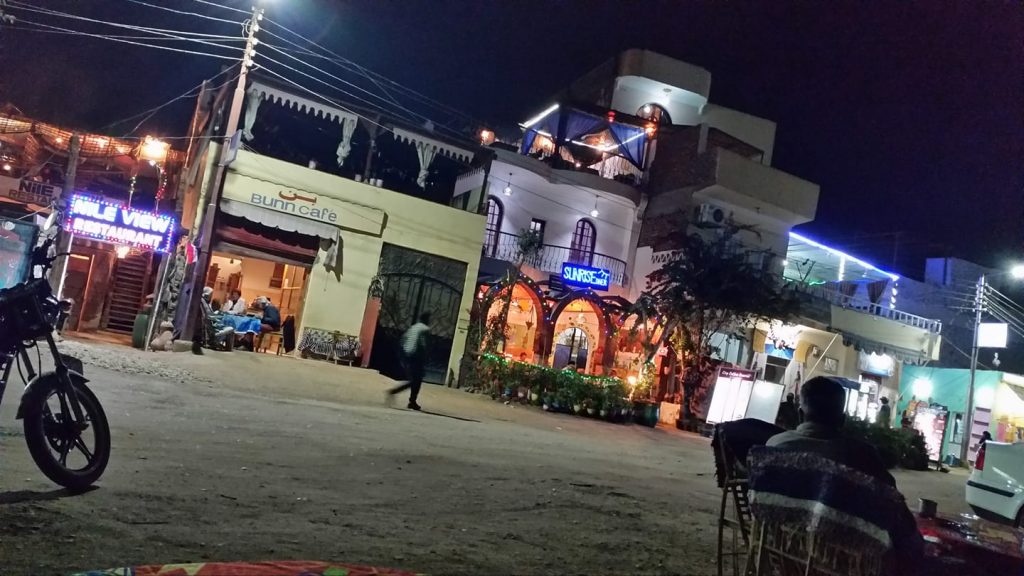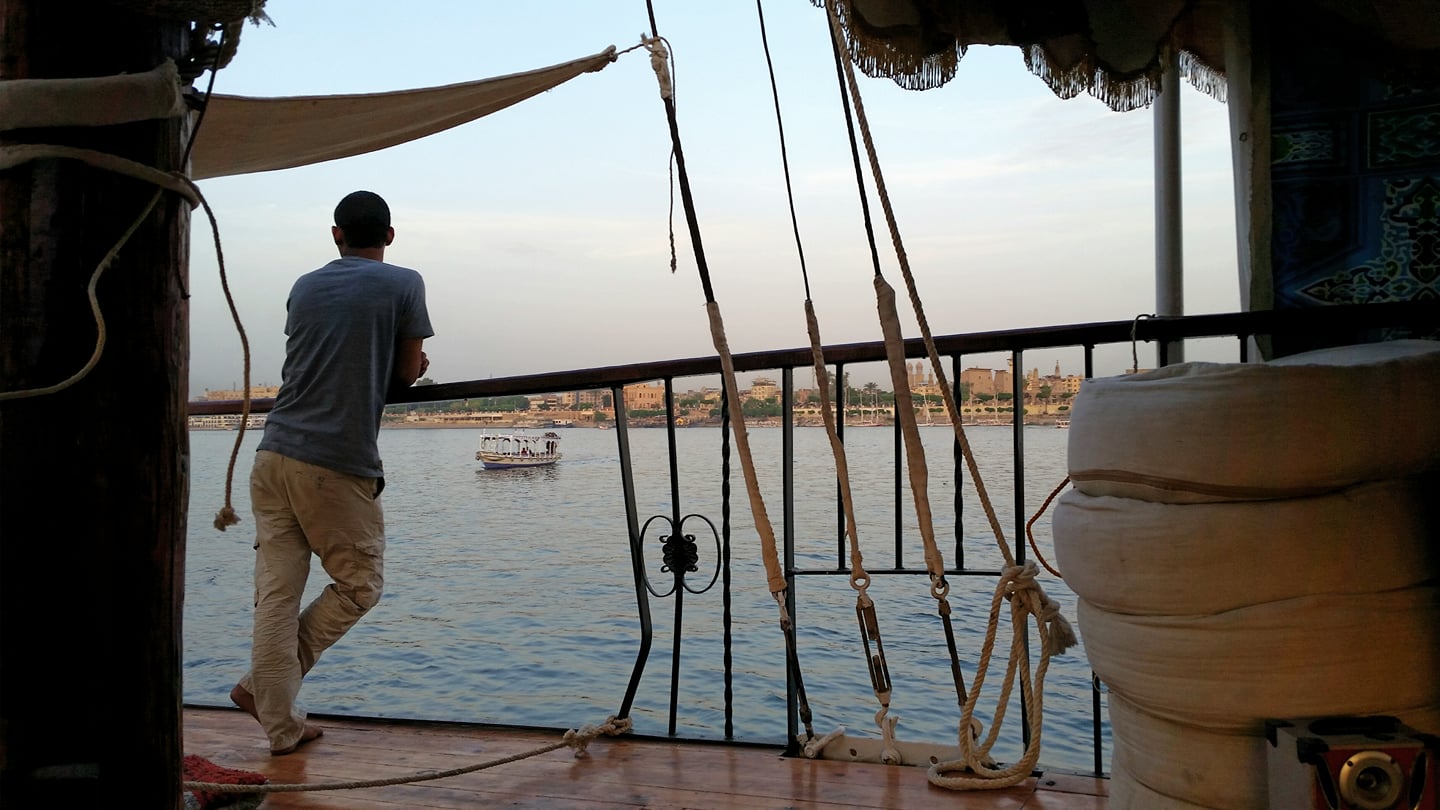[tps_footer][/tps_footer]

“Prostitute!”
“Bitch!”
“Give me my money, bitch!”
“You come to the police station NOW!”
You never leave!”
“Fuck you and all prostitutes who come to our country!”
These were the screams I heard as I approached Gezira Gardens, the hotel where my friend Eva was staying. I could see her silhouette in the back of the taxi, and I could hear her shrill cries of fear mixed with the screams.
Eva and I had been stranded in Luxor, Egypt, during the COVID-19 pandemic. As luck would have it, we had finally found flights out on the same day. Now, it looked likely that Eva wouldn’t be getting on that plane.
The taxi was surrounded by an angry mob of men. One man, the lawyer who had promised to help Eva settle a dispute with her Egyptian ex-husband, was screaming obscenities through the window nearest to where she sat. On the other side, the man who had introduced Eva to the lawyer, had climbed into the backseat and was also screaming obscenities while trying to pull her out of the car. Meanwhile, the horde of men were adding to the melee by banging on the car and screaming, too. Amongst them, I could see Eva’s neighbor, Ahmed, to whom she had sold her villa.
The selling of her villa and expecting to actually be paid for it, was how the problems had all started. There were many men who coveted Eva’s villa – a lovely one, in Ramla, a desirable area – including her ex-husband who tried to say it belonged to him, and Ahmed who had been eyeing it for years and had come to believe it was his by right.
A policeman, large and official in his white uniform, stood next to the car. He was doing nothing. The taxi driver, Mohamad, was sitting in the driver’s seat, unable to move the car forward due to the crowd. Mohamad was someone who had helped me during a few other tricky situations as he had proved reliable. He told me later that when he arrived, he had been threatened. If he took Eva to the airport, the angry men knew where he lived, and they would make him pay. To his credit, he had not abandoned her but had waited for my arrival.
As I got closer to the angry mob, I squared my shoulders and put on my best Moudira (executive) demeanor.
“What is going on here?” I demanded, loud and imperious.
The noise stopped. Everyone recognized me as that trouble-making American woman who had stood up for Eva during this process of selling her villa when other foreign women had abandoned her. It was also well-known that I had stood up, over the past few years, against other scams of local men.
Upon seeing me, the policeman’s eyes grew wide with worry. Immediately, he yanked on the man who was trying to force Eva out of the car, hissing, “Stop, stop!”
The man extricated himself, and faced me, flushed and defiant.
“She cannot go!” he yelled.
At six feet tall, I towered over most of those men.
I’ve always despised bullies. In my younger years, I was married to a physically abusive man. Once I’d freed myself from the marriage, I’d started training in martial arts, a life-long pursuit for me. Achieving a black belt in Tang Soo Do and a brown belt in Eskrima weapons, I’ve been a boxing coach for over ten years with a passion for empowering women and girls to overcome abuse.
I looked at the little man in front of me and swept my eyes across the crowd. Disregarding how hard my heart was beating, I said in a voice of authority, “This is unacceptable! Get away from the car. We are leaving now!”
Miraculously, they backed away, the policeman making a big show of helping to push the crowd back.
I nodded at him and said, “Thank you.” He almost saluted back.
I got into the seat next to Eva and we were on our way. As we distanced ourselves from the crowd, they became emboldened again. Only when we turned the corner and drove along the road by the Nile, all became quiet at last.
To Eva, this represented the end of three months of abuse and downright terror for her, during which time the neighbor had threatened to take the villa by force and she had been repeatedly dragged to the police station in the middle of the night and told she would get jail time if she did not sign over the villa to her ex-husband.
“It’s okay, we made it,” I said.
She shook her head. “I won’t believe it until we’re on the plane to Cairo.” I nodded. “I know.”

It was a forty-five minute drive and, after we’d calmed down a bit, I asked our driver, “So, why do they call foreign women prostitutes?”
He said simply, “Because all foreign women are prostitutes.”
I knew that this taxi driver had his own elderly German ‘wife’ whom he had married with an orfi (unofficial, unregistered) contract. She visited him for a few weeks a year. During that time, he indulged her desires and made her feel as if she was the most beautiful woman on the planet. In return, he extracted as much money and material possessions as he could. The women who were wealthy enough to travel back and forth to Luxor often gave their ‘husbands’ monthly allowances, even when they were back in their home countries.
This was an extremely lucrative business on the west bank of Luxor. If the young men weren’t already doing it, it was what many of them aspired to. The older, more seasoned ones, taught the younger. In some families, there was one good-looking son who did this as his main business. He was expected to share the money he got with the family. Many of them had a few foreign wives who they juggled. There had been a boom in building on the west bank, hundreds of large villas, hotels, men driving newer cars and motorcycles, feluccas, and dahabiyas. All of it was because of money taken either knowingly from these foreign women or swindled from them.
But, even the ones who gave their money knowingly, were shocked, sometimes years later, to find that they owned not one bit of the properties or vehicles that they thought they co-owned with their husbands.
“But why do the men think the women are the prostitutes? It seems like it would be the other way around,” Eva asked our driver as we sped along. Mohamad answered, “The women who come here are porn stars on holiday.”
“Wait, what?” I said incredulously.
“Yes! They come here for sex. They want this, and the men give it to them. This is very clear. So, they should not complain. They get what they want.”
“Even these well – let’s be honest – old and rather ugly women who come here are porn stars?” I asked.
I knew that the men and women here had no sex education and what knowledge they had of sexual acts came from pornography on the internet. Yet, I never dreamed that this had translated into a belief that all Western women actually were porn stars. It seemed too ludicrous.
“Or maybe the old ones are retired porn stars?” Eva suggested with a smirk, some of the stress falling away thanks to this ridiculous conversation.
“You do realize,” I said. “That in Luxor, it’s the men who take the money from the women. Not the other way around. Doesn’t that make the men the prostitutes?”
This was an impossible concept for Mohamad or any other man I ever met in Luxor to fathom. Women were not the ones in power. And, sadly, I found during my time there that most of the women didn’t embrace their power. They caved to the masculine forces very easily, as if it was the most natural thing to do. The majority of the women did not know the language, and the men were not interested in marrying them unless they knew they could get their partners to sign a Orfi contract, and then sign everything over to them thereafter, trusting their husband to ‘take care of them’ and ensure they are not ‘taken advantage of.’

I have heard that there is an overriding belief that foreign women cannot accomplish anything in Luxor without a man. A woman must get married and hand over her rights to her husband if she wants to survive. And in Egypt’s patriarchal society, perhaps more so in rural Egypt than in the cities, this is very often true. The women want to abide by the rules and fit in. They don’t know the language and their husbands explain that they will make sure their wives are not cheated on but get “Egyptian prices.”
From the stories I have heard, and while they do not apply to all, the women who come to Luxor are preyed upon, used and abused, and then discarded when they are no longer useful. No matter how well the men entice the women with beautiful words, there is absolutely no feeling behind those words. The men are on a mission: calculating, cold goals to be attained, even if it takes years to do so.
I met Eva shortly after I returned to Luxor in February of 2020. By that time, I’d been living off and on in Luxor for about two and half years. Eva was an artist from Sweden who had bought a villa in Luxor about eight years previously and came there in the winters, to paint.
One of the reasons why I felt an attachment to Luxor and had wanted to return was I’d involved myself in the community. I’d started a program called Luxor Boxing Girls, teaching girls on the west bank how to box. The girls loved it.
On this most recent trip, I’d hoped to coordinate a program called ‘My World Project’, connecting youth in Luxor with youth in Los Angeles through art and writing. Then, the pandemic struck, and the program fizzled out.
In the last happy days before the pandemic hit, I met Eva at Wanna’s Art Gallery, and we became friends. She was one of the few foreign women in Luxor who owned her own home outright. Or at least, she thought she did.
Like most foreign women, Eva had fallen under the spell of a local man when she first arrived, about eight years previously, and gone through an Orfi marriage. But, she’d realized the error of her ways, and had ended the marriage years ago. Since then, she hadn’t been with any man in Luxor.
Being a single foreign woman in Luxor was a rarity.
Luxor can be seen as a colorful place of ruthless con artists. As a writer, it’s a fascinating place to sit back and observe the dramas. From my experienced perspective now, I see how the women stepping off of planes and cruise ships, oohing and awing at the marvelous sites, can be considered perfect prey.
I have often wondered if a magic spell doesn’t fall on women the moment they arrive. Without a doubt, it’s a magical place, recalling girlhood romantic dreams of The Arabian Nights. The men are part of that magic, weaving stories of love in melodious voices that would sound stupid under ordinary circumstances.
From the men’s perspective, they can also feel preyed upon as patriarchy also demands that men fulfill hefty duties. It becomes their job to take care of their foreign partners who can become quite demanding, and who are largely lacking understanding about Egypt’s cultural cues. Men, too, find themselves navigating uncharted territories of providing and pampering.
Yet, in the case of the women, there almost seems to be a repeated formula to how they are seduced:
“I never met anyone like you before.”
“I feel I know you forever.”
“Age doesn’t matter when it is love.”
“Really, I am different. I am not like the others.”
“Trust me. I give you everything. I promise. You are my heart. My life.”
This is some of the sweet-talk foreign women commonly hear.
For these women, it’s a last chance at love. No matter how unwanted they felt in their home countries, in Luxor they felt special and loved. Just sit in an outside café along the corniche and watch the scores of elderly women walking by with their young men, or bouncing along behind them on the back of motorcycles.
To these women, the romance of it all is the attraction. As an outsider, when I am watching these elderly women parading along the corniche with their young lovers, I am convinced that it is almost impossible that these men love them, and that women are blind to it.
Luxor reminds me of Las Vegas, where the minute people arrive they lose all rational thought and self-control. Perfectly normal folks who would never do such a thing back home, gamble away their hard-earned money to the point of destitution.
The lost women of Luxor gamble away everything for love. Sadly, I never met a single one who won at this game. Maybe they are there. I hope so, I just haven’t met them.
During the pandemic, the desperation to make money became more apparent than ever. The tourists departed, and the men turned sour. The competition was fierce. There were few to play their tricks on. The main road along the Nile was empty at night. No women they could woo.
All that was left were the ghostly women who had already lost everything and couldn’t escape. These women came out after dark, wandering the streets in flowing robes, hissing at one another, friends one day and enemies the next. Bored, lonely and often drunk and high.
Next to me lived an elderly British woman who was intelligent, had worked as a journalist for the BBC in her younger years, and came from a posh family. Before coming to Luxor, she’d been living in Cairo.
About three years previously, her husband had died and she had moved to Luxor. She quickly married a younger Egyptian man and gave him control of all her money. One evening, she told me how over the course of two short years, she lost everything, and was now living on a small pension.
Yet, incredibly, she still loved her husband and kept the illusion alive that he loved her. But what else could she do? She didn’t have the money to go back to England, where she had no close-knit community. It seemed to me, in order to make life bearable, she told herself this false story of love. This is what so many of the women did. Sadly, she died not that long ago, from an overdose. One more lost soul.
A mysterious trend
There are so many women like this in Luxor. Many of them are ill, or suffering from alcoholism, and with no help from family or friends. When they die, they are buried in a cemetery on the edge of the desert, within a short distance of the Valley of the Queens.
Usually, they are women who come with high hopes, falling in love, believing in the fairytale, becoming prisoners of their own folly, and then dying lonely deaths in obscurity. Buried beneath the sands with all the millions of bones that still littered the earth.
Eva didn’t want to end up in that cemetery. She’d had enough of the intrigues of Luxor. The pandemic seemed to have brought all the worst traits of Luxor to the surface, and she felt if she didn’t get rid of the villa now, perhaps she never would.
Eva was lucky to get out when she did. The lies, the threats, the abuse. Her story is a cautionary tale of how men are able to get away with pretty much anything when society tells them that they are the rulers, they have the power, and all foreign women are prostitutes. Or rather, porn stars on holiday.
Any opinions and viewpoints expressed in this article are exclusively those of the author. To submit an opinion article, please email [email protected].







Comments (2)
[…] This is known as The City of the Dead, also known as the Valley of the Kings. It left a huge impression on me as a child, and I returned to live there as an adult for three years. I left Egypt about six months into the pandemic, an adventure I wrote about in my article for Egyptian Streets, Tales of Eclipse: the Lost (Foreign) Women of Luxor. […]
[…] This is known as The City of the Dead, also known as the Valley of the Kings. It left a huge impression on me as a child, and I returned to live there as an adult for three years. I left Egypt about six months into the pandemic, an adventure I wrote about in my article for Egyptian Streets, Tales of Eclipse: the Lost (Foreign) Women of Luxor. […]